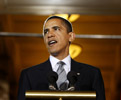
This op-ed originally appeared in today’s Guardian.
After a lengthy internal battle, the Obama administration has formally rolled out its new Sudan policy. The policy spells out some ambitious goals: a definitive end to conflict and genocide in Darfur, implementation of the 2005 North-South peace deal and peaceful moves toward a 2011 referendum that will likely result in South Sudan becoming independent.
Like many such policy reviews, this one looks good enough on paper. But how will we know if this policy is actually working? These are the practical measures by which Obama’s new policy will ultimately be judged a success or a failure.
Returns
In Darfur, there is probably no better barometer for the relative success or failure of the international community than the almost 3 million people who remain displaced or refugees after having been forced to flee from their homes by the government-backed janjaweed militias.
Refugees and the displaced vote with their feet. They are almost universally desperate to return to their former homes, but will only do so if security is sufficient for them to do so. To date, the UN force on the ground in Darfur has been largely ineffective, there has been no credible effort to disarm the janjaweed militias that caused such havoc and peace talks for Darfur have moved forward fitfully. Refugees and displaced persons know full well that their lands and villages are still occupied by armed thugs responsible for some of this century’s most horrific war crimes.
Under such conditions it would be madness for these families who have already suffered so much to return home. The answer: a far more effective and robust peacekeeping force on the ground (with Khartoum’s de facto veto power over UN operations taken away), practical steps to disarm the janjaweed and a solid peace agreement between the government and rebel forces brokered with international oversight and guarantees.
The White House policy review places a lot of emphasis on a peace deal in Darfur. However, there have been few signs Washington or European capitals are willing to tackle the tough choices required to improve security on the ground, and officials have often been overly eager to portray a recent lull in fighting in Darfur as a sign that the fundamentals are improving.
Click here to continue reading about the other fronts on which Obama’s Sudan policy will be tested.

